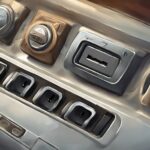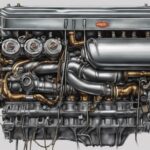When it comes to gas mileage, there are many factors that can affect it. The fuel filter is responsible for keeping contaminants and debris out of the engine and ensuring that the fuel flowing into the engine is clean and free of impurities. So, can a bad fuel filter cause bad gas mileage?
Yes, a bad fuel filter can cause a variety of problems, including decreased fuel efficiency. When a fuel filter is clogged, it restricts the flow of fuel to the engine, which can cause the engine to run lean. This means that there is not enough fuel in the combustion chamber to burn efficiently, which can result in poor fuel economy.
A clogged fuel filter can also cause the fuel injectors to become dirty or damaged, which can further reduce fuel efficiency. When the injectors are not functioning properly, they won’t deliver the correct amount of fuel to the engine, which can cause the engine to run poorly and a reduction in fuel economy.
There are many signs that a fuel filter may be clogged or dirty, including poor gas mileage, decreased engine performance, and difficulty starting the engine.
In this article we’ll look at the signs of a bad fuel filter, how this impacts the fuel economy of the engine and how you can fix it.
Signs of a Bad Fuel Filter That Can Cause Bad Fuel Economy
Over time, the fuel filter can become dirty, and sometimes partially blocked, leading to a range of problems, including bad gas mileage.
There are several common symptoms of a bad fuel filter that can be linked to bad fuel economy. These include:
- Engine Misfires: A clogged fuel filter can cause the engine to misfire, which can lead to a decrease in fuel efficiency.
- Hard Starting: If the engine is having difficulty starting, it may be a sign that the fuel filter is clogged, preventing fuel from reaching the engine.
- Stalling: A clogged fuel filter can cause the engine to stall, which can be dangerous if it happens while driving.
- Decreased Power: If the engine is not receiving enough fuel due to a clogged fuel filter, it may have decreased power, which can result in poor fuel economy if you need to press the throttle pedal harder to get the acceleration power you need.
- Decreased Acceleration Power: A clogged fuel filter can also cause a decrease in acceleration, which can lead to poor fuel efficiency.
These symptoms can have many causes, but they can often occur because of a blocked fuel filter. If your car has any of these symptoms, you should have the fuel filter checked and replaced if necessary as ignoring these symptoms can lead to damage to the engine and not just a decrease in fuel efficiency.
Will Changing The Fuel Filter Improve Bad Gas Mileage?
A bad fuel filter can cause bad gas mileage, and depending on how dirty it is, changing it may help to improve bad gas mileage.
The fuel filter is there to stop dirt and grit from the fuel tank from getting to the engine. When the fuel filter becomes clogged or dirty, it can restrict the flow of fuel to the engine, causing a decrease in fuel efficiency and gas mileage.
Here are a few reasons why changing the fuel filter can improve gas mileage:
- Improved Fuel Flow: A clean fuel filter allows fuel to flow more freely to the engine, which can improve fuel efficiency and performance.
- Reduced Strain On The Fuel Pump: A clogged fuel filter can cause the engine to work harder to get the fuel it needs, which can reduce fuel efficiency and increase wear and tear on the fuel pump. Changing the fuel filter can help reduce this strain and improve fuel economy.
- Cleaner Fuel Injectors: A dirty fuel filter can allow contaminants to reach the fuel injectors, which can cause them to become clogged or damaged. This can lead to poor engine performance and reduced fuel efficiency. Changing the fuel filter can help keep the fuel injectors clean and functioning properly.
- Preventative Maintenance: Changing the fuel filter on a regular basis is an important part of preventative maintenance for your vehicle. By keeping the fuel filter clean and functioning properly, you can help ensure optimal engine performance and fuel efficiency over the life of your vehicle.
A bad fuel filter is not the only cause of poor gas mileage. Other factors, such as a faulty engine sensor, dirty air filter, low tire pressure, or using the wrong fuel type with the wrong octane rating for your car, can also contribute to poor gas mileage.
How does a bad fuel filter affect gas mileage?
A bad fuel filter can affect gas mileage by reducing the amount of fuel that reaches the engine. The fuel filter is responsible for removing any dirt, debris, or other contaminants from the fuel before it reaches the engine. Over time, the fuel filter can become clogged with these contaminants, reducing the flow of fuel to the engine.
When the fuel filter is clogged, the engine won’t receive enough fuel to operate as efficiently as it should. A lack of fuel will cause the engine to run lean, which means there is too much air and not enough fuel in the combustion chamber.
A lean fuel mixture can cause the engine to run hotter than normal, which can lead to engine damage over time. It can also cause the engine to run less efficiently, which will result in decreased gas mileage.
A bad fuel filter can also cause the engine to stall or hesitate during acceleration, which can further reduce gas mileage if you are constantly pushing harder on the accelerator than you would normally need to.
What is the relationship between blocked fuel filters and fuel efficiency?
Fuel filters play an important role in maintaining fuel efficiency. A clean fuel filter allows for the proper flow of fuel to the engine by helping to maintain adequate fuel pressure within the fuel lines.
When the engine is running normally, it burns fuel more efficiently, which can lead to better gas mileage. On the other hand, a clogged fuel filter restricts the flow of fuel to the engine, which can cause the engine to run inefficiently and lead to a decrease in gas mileage.
Examples of how a bad fuel filter can cause bad gas mileage
There are several signs that a bad fuel filter can cause bad gas mileage. Some of the most common signs include rough idling, engine hesitation, and decreased acceleration. When the fuel filter is clogged, the engine may struggle to get the fuel it needs to perform properly, which can cause these symptoms.
A clogged fuel filter can cause the engine to run rich, which means that it is burning more fuel than necessary. This can lead to a decrease in gas mileage over time.
Regular maintenance of the fuel filter can help ensure that it is clean and functioning properly, which can lead to better gas mileage and improved engine performance.
What Next – How to Diagnose and Fix a Bad Fuel Filter
Explanation of How to Diagnose a Bad Fuel Filter
As we’ve discussed above, a bad fuel filter can cause a variety of issues, including bad gas mileage.
To diagnose a bad fuel filter, look for signs such as engine misfires, stalling, and difficulty starting the engine. If your car is not accelerating as it should or you notice a decrease in power, it could be a sign of a clogged fuel filter.
To diagnose a bad fuel filter, follow these steps:
- Check the fuel pressure: Use a fuel pressure gauge to check if the fuel pressure is within the recommended range. If it’s not, it could indicate a clogged fuel filter.
- Inspect the fuel filter: Remove and check the fuel filter for signs of dirt, debris, or damage. A clogged fuel filter can cause a decrease in fuel pressure and lead to poor gas mileage.
- Check the fuel injectors: If the fuel injectors are clogged, it could be a sign of a bad fuel filter. Have the fuel injectors checked by a specialist for signs of blockages or incorrect spray patterns.
Replacing the Fuel Filter
If you’ve determined that your fuel filter is bad, it’s important to replace it as soon as possible. Here are the steps to replace your fuel filter:
- Locate the fuel filter: The fuel filter is typically located near the fuel tank or under the hood of the car.
- Relieve the fuel pressure: Before replacing the fuel filter, relieve the fuel pressure to prevent fuel from spraying everywhere.
- Remove the old fuel filter: Use a wrench to loosen the fuel filter and remove it from the car.
- Install the new fuel filter: Install the new fuel filter in the same location as the old one and tighten it securely with a wrench.
- Test the new fuel filter: Start the engine and check for any leaks. If there are no leaks, the new fuel filter is installed correctly.
FAQ
1. What is considered bad gas mileage?
The definition of “bad” gas mileage can vary depending on the vehicle and driving conditions. In general, a vehicle that gets less than 20 miles per gallon (MPG) in the city and less than 25 MPG on the highway can be considered to have poor gas mileage. However, this can vary based on factors such as the vehicle’s size, weight, and engine type, as well as driving habits and conditions.
For example, larger vehicles such as trucks and SUVs are typically less fuel-efficient than smaller vehicles, and vehicles with high-performance engines may have lower gas mileage than those with more efficient engines. Similarly, driving habits such as aggressive acceleration and braking or excessive idling can also reduce gas mileage.
Gas mileage can also vary based on driving conditions such as traffic congestion, road conditions, and weather. In general, vehicles will get better gas mileage on the highway than in the city due to the higher speeds and more consistent driving conditions.
Ultimately, what is considered “bad” gas mileage will depend on the specific vehicle and driving conditions. If you are concerned about your vehicle’s gas mileage, you can check the EPA fuel economy ratings for your vehicle or consult with a professional mechanic to determine if there are any underlying issues affecting your vehicle’s fuel efficiency.
1. How much does it cost to replace a fuel filter?
The cost to replace a fuel filter can vary depending on the make and model of the vehicle, as well as the location and the type of fuel filter being used. In general, the cost of replacing a fuel filter can range from $50 to $200 for most cars.
According to Kelley Blue Book, a fuel filter replacement service should cost between $50 and $175 for most cars to have the work done by a mechanic. However, the cost can vary depending on the location and the type of fuel filter being used.
RepairPal estimates that the cost of a fuel filter replacement is between $170 and $206, with labor costs estimated between $87 and $109 and parts priced between $84 and $96.
It’s important to note that the cost of a fuel filter replacement may be higher for certain vehicles, such as those with more complex fuel systems or hard-to-reach fuel filters. In addition, if there are other issues with the fuel system, such as a clogged fuel pump or fuel injectors, the cost of repairs may be higher.









